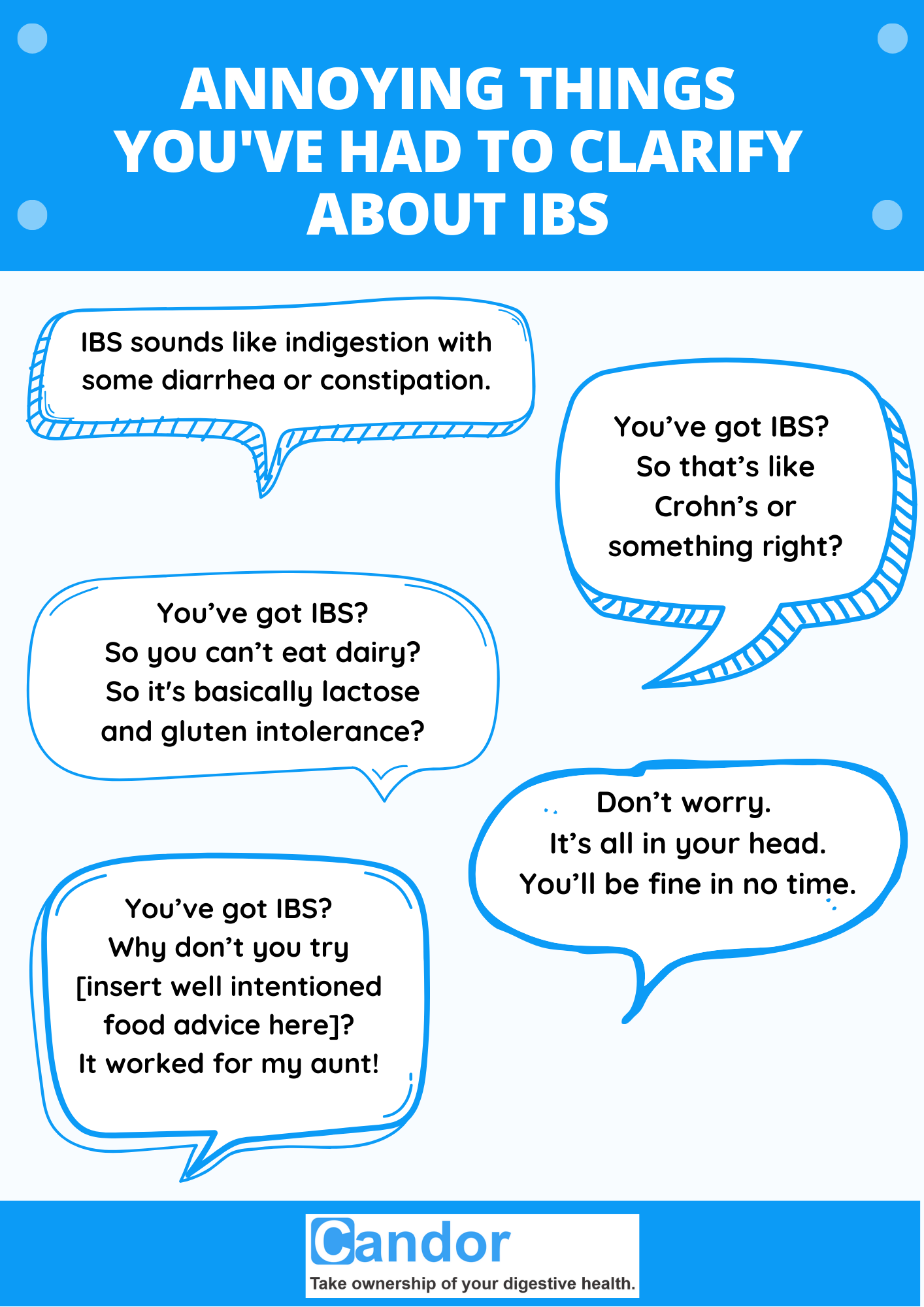
#1. IBS sounds like indigestion with some diarrhea or constipation.
Reality: IBS is a lot more than some diarrhea or constipation. It can cause distress and have a significant negative impact on a person’s quality of life. People with IBS-D can become afraid to leave home without assurances of readily available toilets. Chronic constipation can create intense pain and bloating. The constant presence of symptoms like these can lead to absences from work or school that, in turn, can induce social isolation, increase depression and other mental health issues.
#2. You’ve got IBS? So that’s like Crohn’s or something right?
Reality: IBD (Crohn’s and Ulcerative Colitis) and IBS are two illnesses that can affect the gastrointestinal (GI) tract. Both can cause abdominal pain and changes in bowel movements. However, they are not the same.
Irritable bowel syndrome (IBS) is a group of symptoms that cause digestive, abdominal discomfort and/or changes in the pattern of bowel movements without any evidence of underlying damage. IBS is what doctors call a functional disease – there will be a group of symptoms, but tests won’t show any physical explanation for those problems.
Inflammatory bowel disease (IBD) is a term for two conditions (Crohn’s disease and ulcerative colitis) that are characterized by chronic inflammation of the gastrointestinal (GI) tract. Prolonged inflammation results in damage to the GI tract. The exact cause of IBD is unknown, but is likely the result of a defective immune system.
Learn more about Crohn’s Disease by clicking on this link.
# 3. You’ve got IBS? So you can’t eat dairy? So its basically lactose and gluten intolerance?
Reality: Nope. Not it at all really.
While many people with IBS exhibit intolerance to dairy and/or gluten, there are many people with IBS who are completely fine eating foods with dairy or gluten. Similarly, there are people with allergies to these foods who do not display any symptoms of IBS. One does not imply the other. At its core, IBS causes irritation because it affects the function and behavior of the intestines. Normally, the muscles lining the intestines contract and relax to move food along the digestive tract. In IBS, this pattern is disturbed, resulting in uncomfortable symptoms. In addition, there can be a disturbance in sensation, with heightened sensitivity to normal gas or stool passing through the GI tract.
# 4. Don’t worry. It’s all in your head. You’ll be fine in no time.
Reality: This is insensitive and inconsiderate to tell anyone, let alone someone with IBS. IBS is a functional disorder, which means there are no obvious visual signs of illness, such as the inflammation in IBD. However, it is still a very real GI issue and worrying about symptoms flaring up invariably causes them to appear from all the stress and anxiety.
IBS symptoms can impact a patient’s thinking and attitude. What are the common thoughts that IBS symptoms can induce?
# 5. You’ve got IBS? Why don’t you try [insert well intentioned food advice here]? It worked for my aunt!
Reality: Each individual’s journey with IBS is personal and unique. Each person reacts differently to treatments and diets and it is important to get a professional medical opinion before embarking on a new diet or course of treatment. Speak with your physician, gastroenterologist, and/or registered dietitian to find the treatment that works best for you.
IBS patients mostly have different trigger foods. One kind of diet can work for some but not work for all. Some are intermittent fasting and low-FODMAP diet. Both of which can be used to fight IBS symptoms but is not effective for everyone.



























